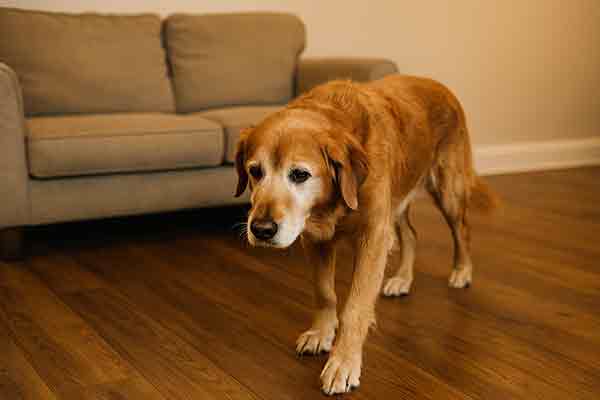My Senior Dog Is Pacing and Won’t Lie Down | Causes & What to Do
Table of Contents
- Introduction
- Why Do Senior Dogs Pace?
- Common Medical Causes
- Behavioral and Emotional Reasons
- Pain and Discomfort in Elderly Dogs
- Canine Cognitive Dysfunction (Dog Dementia)
- When to Call the Vet
- Home Care Tips for a Pacing Senior Dog
- FAQ
- Conclusion
Introduction
It can be distressing to watch your senior dog pacing and refusing to lie down. These behaviors may indicate discomfort, confusion, or even pain. But what exactly causes these behaviors, and how should you respond? In this article, we’ll explore why elderly dogs pace, what it means when they won’t settle, and how to help your beloved companion feel more comfortable.
Why Do Senior Dogs Pace?
Pacing in senior dogs can be due to a variety of physical or emotional issues. It’s a behavior that can signal:
- Physical pain or discomfort
- Neurological conditions like cognitive dysfunction
- Stress or anxiety
- Internal discomfort (e.g., gastrointestinal issues)
- Side effects of medication
Understanding the underlying cause is key to helping your dog relax and regain comfort.
Common Medical Causes
If your senior dog is pacing and won’t lie down, medical issues could be to blame. Some of the most common causes include:
1. Arthritis or Joint Pain
Older dogs often suffer from arthritis, making it painful to lie down or get comfortable. They may pace in an effort to avoid pain.
2. Gastrointestinal Discomfort
Bloating, nausea, or indigestion may prevent your dog from resting. Senior dogs may pace, pant, or whine when experiencing digestive discomfort.
3. Neurological Conditions
Issues such as vestibular disease or seizures can cause pacing, disorientation, or difficulty lying down.
4. Heart Disease or Respiratory Distress
If your dog is having trouble breathing or their heart isn’t functioning properly, lying down can feel uncomfortable or scary.
Behavioral and Emotional Reasons
Behavioral and emotional factors may also explain your senior dog’s pacing. These include:
1. Anxiety or Stress
Changes in routine, environment, or separation from loved ones can trigger anxiety. Dogs may pace or pant to self-soothe.
2. Confusion or Disorientation
Older dogs may lose their sense of time, place, or familiarity, causing them to wander or avoid lying down.
3. Compulsive Behavior
In some dogs, pacing becomes a compulsive act, especially when their normal behavior patterns are disrupted by age-related changes.
Pain and Discomfort in Elderly Dogs
Pain is one of the most overlooked reasons why senior dogs refuse to lie down. Signs of pain in older dogs include:
- Whimpering or groaning
- Pacing at night or during rest periods
- Stiffness, limping, or reluctance to move
- A hunched back or guarded posture
If you suspect your dog is in pain, consult your vet. Pain relief medication, orthopedic beds, and gentle exercise may help.
Canine Cognitive Dysfunction (Dog Dementia)
Canine Cognitive Dysfunction (CCD) is a common condition in aging dogs. Similar to Alzheimer’s in humans, it can cause:
- Disorientation
- Repetitive pacing
- Sleep disturbances
- Changes in social interaction
Dogs with CCD may pace for hours, become stuck in corners, or forget familiar routines. Management includes veterinary support, medications, and environmental enrichment.
When to Call the Vet
Not all pacing is cause for alarm, but you should contact your veterinarian if your senior dog shows any of the following signs:
- Pacing continuously for more than a few hours
- Refusal to eat or drink
- Signs of pain, limping, or stiffness
- Restlessness combined with vomiting, diarrhea, or coughing
- Confusion, head pressing, or getting stuck
Early diagnosis can make a big difference in treating the underlying issue.
Home Care Tips for a Pacing Senior Dog
Here are some practical ways to help your senior dog who won’t lie down:
- Provide a supportive orthopedic dog bed
- Keep the environment quiet and familiar
- Use calming aids like pheromone diffusers or anxiety wraps
- Stick to a consistent daily routine
- Take short, gentle walks to ease stiffness and anxiety
- Consider supplements like glucosamine or omega-3s (vet-approved)
FAQ
Why is my elderly dog pacing all night?
Night pacing may be due to cognitive decline, anxiety, or discomfort. A veterinary checkup can help identify the cause and provide treatment options.
Should I let my senior dog pace or try to stop it?
If the pacing is mild and occasional, it may be okay. But frequent or distressed pacing warrants attention and possibly medical intervention.
Can medication help my senior dog stop pacing?
Yes. Medications for pain, anxiety, or cognitive dysfunction can help reduce pacing. Always consult your vet before starting any treatment.
Is pacing a sign my dog is dying?
Not necessarily. While pacing can be a sign of discomfort or decline, it doesn’t always mean your dog is at the end of life. A vet can help you assess your dog’s overall health.
How can I comfort my dog at night?
Try a calming bedtime routine, soft lighting, a comfortable bed, and gentle music. Your vet may also recommend supplements or sedatives for nighttime anxiety.
Conclusion
If your senior dog is pacing and won’t lie down, it’s important to observe carefully and consult your veterinarian. The behavior could stem from pain, anxiety, or even dementia—but with proper care, many causes can be managed. Stay patient, supportive, and proactive. With the right approach, your aging dog can still enjoy comfort and peace in their golden years.
For more expert tips on caring for senior dogs, follow our blog and subscribe to our newsletter for weekly updates.







